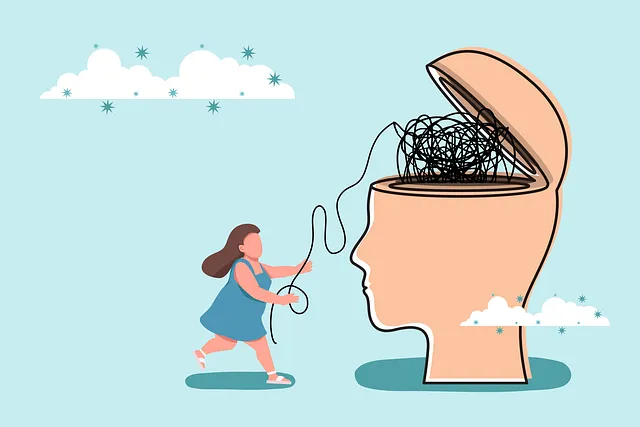The Aurora Kaiser Permanente Behavioral Health Center identifies a growing need for accessible, personalized mental wellness solutions in a stressful world, with mental wellness apps seen as a promising alternative. These apps should offer tailored self-care practices, improve emotional well-being, and build resilience through features like goal-setting dashboards, stress management tools, anxiety relief exercises, journaling, mindfulness practices, cognitive-behavioral therapy techniques, and games. Ethical development, robust privacy measures, evidence-based content, and inclusive design are crucial for gaining user trust and fostering safe, supportive digital environments.
In today’s fast-paced world, mental wellness app development has emerged as a crucial tool for enhancing access to care. As recognized by experts at Aurora Kaiser Permanente Behavioral Health Center, these applications offer personalized support and resources for managing stress, anxiety, and other mental health concerns. This article explores key aspects of creating effective mental wellness apps, including understanding user needs, implementing essential features, addressing ethical considerations, and prioritizing privacy—all informed by insights from the leading edge of behavioral health at Aurora Kaiser Permanente.
- Understanding the Need for Mental Wellness Apps: A Perspective from Aurora Kaiser Permanente Behavioral Health Center
- Key Features and Functionality to Consider in Development
- Ethical Considerations and Privacy in Mental Health App Design
Understanding the Need for Mental Wellness Apps: A Perspective from Aurora Kaiser Permanente Behavioral Health Center

At Aurora Kaiser Permanente Behavioral Health Center, we’ve witnessed firsthand the growing demand for accessible and personalized mental wellness solutions. In today’s fast-paced world, stress and anxiety have become ubiquitous companions for many individuals. This trend has sparked a significant need for innovative tools that support mental health awareness and promote positive thinking. Mental wellness apps offer a promising avenue to bridge this gap by providing individuals with convenient access to self-care practices tailored to their unique needs.
By leveraging technology, these applications can help users cultivate healthier coping mechanisms, enhance emotional well-being, and foster resilience in the face of life’s challenges. At our behavioral health center, we recognize that mental wellness apps have the potential to revolutionize care delivery by extending support beyond traditional clinical settings, ultimately contributing to a more holistic approach to overall well-being.
Key Features and Functionality to Consider in Development

When developing a mental wellness app, incorporating key features that cater to users’ diverse needs is essential. According to experts at Aurora Kaiser Permanente behavioral health center, platforms should offer comprehensive tools for stress management, anxiety relief, and mental wellness journaling exercises. These components not only help individuals track their progress but also provide guidance tailored to their unique challenges.
Functionality should include personalized dashboards, allowing users to set goals and receive customized recommendations based on their inputs. Incorporating mindfulness practices, cognitive-behavioral therapy techniques, and engaging games designed for anxiety relief can significantly enhance the app’s effectiveness. Additionally, secure data syncing and privacy measures are crucial to ensuring user trust, making it easier for individuals to openly engage with their mental wellness journey.
Ethical Considerations and Privacy in Mental Health App Design

In the realm of mental health app development, ethical considerations and privacy are paramount. As users share deeply personal information about their emotional well-being, it’s crucial for developers to prioritize data security and confidentiality. Apps like those offered by Aurora Kaiser Permanente behavioral health center must adhere to strict privacy standards, ensuring user data is protected from unauthorized access or breaches. This involves implementing robust encryption methods, secure storage solutions, and transparent data handling practices.
Moreover, ethical design demands that these apps promote mental wellness responsibly. Features such as Inner Strength Development modules should be evidence-based and led by qualified professionals. Conflict Resolution Techniques integrated into the app should be tailored to support users’ unique challenges while maintaining a safe and supportive digital environment. Developers must also avoid pathologizing or stigmatizing certain conditions, ensuring instead that content is inclusive and respectful of diverse mental health journeys.
The development of mental wellness apps, as highlighted by the insights from the Aurora Kaiser Permanente Behavioral Health Center, is a growing necessity in today’s digital age. By incorporating key features such as personalized therapy sessions, mindfulness practices, and community support, these applications can significantly contribute to improved mental health outcomes. However, it is imperative to address ethical considerations and prioritize user privacy to ensure the safety and efficacy of these digital tools. With careful design and an emphasis on responsible development, mental wellness apps have the potential to reach a wide audience, offering accessible and effective support for those seeking assistance.






